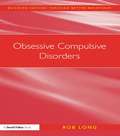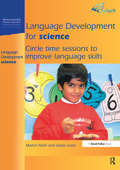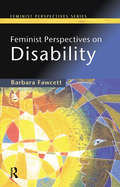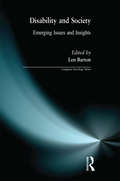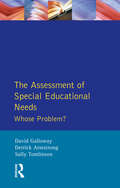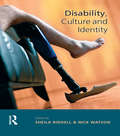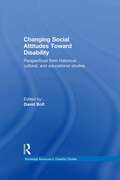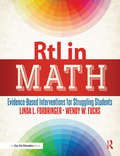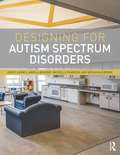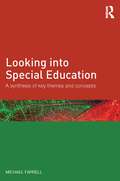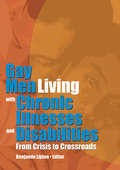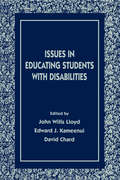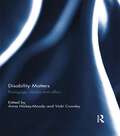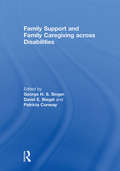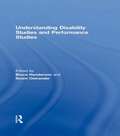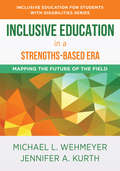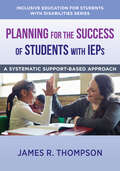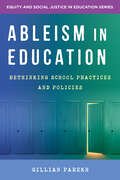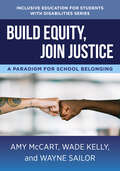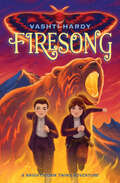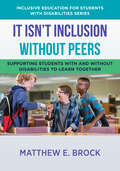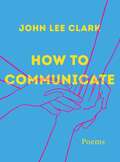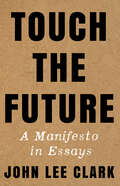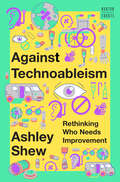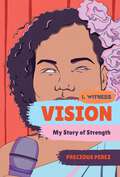- Table View
- List View
Obsessive Compulsive Disorders (nasen spotlight)
by Rob LongSchools are often faced with dealing with children who have mild forms of obsessive compulsive disorder. Through increased understanding, staff can support children with minimum stress. This book answers questions including: What is obsessive compulsive disorder? What are the causes? How can school staff help the sufferer?
Language Development for Science: Circle Time Sessions to Improve Language Skills
by Marion Nash Jackie LoweThis book is the first of its kind to help practitioners specifically develop children's language skills in Science. The book incudes: guidelines to help teachers set up, run and assess circle-time sessions ideas for promoting children's thinking skills and emotional literacy video CD containing explanation and demonstration of the programme and its implementation, with comments from staff who have used it.
Feminist Perspectives on Disability (Feminist Perspectives)
by Barbara FawcettFeminist Perspectives on Disability provides a unique introduction to the key debates in relation to both feminism and disability. The author considers contemporary similarities, differences and contentious areas and how concepts drawn from postmodern feminism can be usefully applied to the disability arena. The book explores many important aspects of the field, including: biological debates; issues of power, knowledge, equality, difference, subjectivity and the body; interface of public and private/care and community; medical and social barriers; politics, citizenship and identity.Feminist Perspectives on Disability will be compulsory reading for students of all levels in Women's Studies, Gender Relations, Social Policy, Social Work/Social Care and social Science.
Disability and Society: Emerging Issues and Insights (Longman Sociology Series)
by Len BartonThe study of disability has traditionally been influenced mainly by medical and psychological models. The aim of this new text, Disability and Society, is to open up the debate by introducing alternative perspectives reflecting the increasing sociological interest in this important topic.Disability and Society brings together for the first time some of the most recent original research in this rapidly expanding area. The contributors, both disabled and non-disabled, are all leading thinkers in their field and suggest new ways of understanding disability, developing policy and challenging current practice.
The Assessment of Special Educational Needs: Whose Problem? (Effective Teacher, The)
by David M Galloway Derrick Armstrong Sally TomlinsonThe debate about special needs provision has increased dramatically over the last 15 years, however, despite the widespread concern over both learning and behavioural difficulties, there have been few attempts to analyse in detail the process of assessment by which children are being identified as having special educational needs. Drawing upon research carried out by the authors, this book fills that gap by examining the process in detail. It considers the assessment process itself and how it affects and is affected by other areas of school policy - in some cases causing tension and conflict such as parental participation, the use and allocation of resources and multi-professional decision-making. A feature of the book is its analysis of the impact of the National Curriculum and the local management of schools (LMS) provision for special needs.
Disability, Culture and Identity
by Sheila Riddell Nick WatsonFirst published in 2003. Routledge is an imprint of Taylor & Francis, an informa company.
Changing Social Attitudes Toward Disability: Perspectives from historical, cultural, and educational studies (Routledge Advances in Disability Studies)
by David BoltWhilst legislation may have progressed internationally and nationally for disabled people, barriers continue to exist, of which one of the most pervasive and ingrained is attitudinal. Social attitudes are often rooted in a lack of knowledge and are perpetuated through erroneous stereotypes, and ultimately these legal and policy changes are ineffectual without a corresponding attitudinal change. This unique book provides a much needed, multifaceted exploration of changing social attitudes toward disability. Adopting a tripartite approach to examining disability, the book looks at historical, cultural, and education studies, broadly conceived, in order to provide a multidisciplinary and interdisciplinary approach to the documentation and endorsement of changing social attitudes toward disability. Written by a selection of established and emerging scholars in the field, the book aims to break down some of the unhelpful boundaries between disciplines so that disability is recognised as an issue for all of us across all aspects of society, and to encourage readers to recognise disability in all its forms and within all its contexts. This truly multidimensional approach to changing social attitudes will be important reading for students and researchers of disability from education, cultural and disability studies, and all those interested in the questions and issues surrounding attitudes toward disability.
RtI in Math: Evidence-Based Interventions for Struggling Students
by Wendy Fuchs Linda ForbringerLearn how to help K–8 students who struggle in math. This book provides a variety of clear, practical strategies that can be implemented right away to boost student achievement. You will find out how to design lessons that work with struggling learners, implement the recommendations for math intervention from the What Works Clearinghouse, use praise and self-motivation more effectively, develop number sense and computational fluency, teach whole numbers and fractions, increase students’ problem-solving abilities, and more! Extensive examples are provided for each strategy, as well as lesson plans, games, and resources.
Designing for Autism Spectrum Disorders
by Angela Bourne Michelle Pearson Kristi Gaines Mesha KleibrinkWinner of the 2017 IDEC Book Award, 2017 EDRA Great Places Award (Book Category), 2017 American Society of Interior Designers Joel Polsky Prize and the 2016 International Interior Design Association TXOK Research Award Designing for Autism Spectrum Disorders explains the influence of the natural and man-made environment on individuals with autism spectrum disorders (ASD) and other forms of intellectual/developmental disabilities (IDD). Drawing on the latest research in the fields of environmental psychology and education, the authors show you how architecture and interior spaces can positively influence individuals with neurodiversities by modifying factors such as color, lighting, space organization, textures, acoustics, and ventilation. Now you can design homes, therapeutic environments, work environments, and outdoor spaces to encourage growth and learning for the projected 500,000 children with ASD (in the United States alone) who are expected to reach adulthood by 2024. Topics discussed include:-Environmental design theories-Symptoms of ASD-Sensory processing deficits -Design needs of individuals on the spectrum at all ages-Design methods and solutions for spaces, including residential, learning, work, and therapeutic environments encompassing a wide range of budgets-Designing for self-actualization, well-being, and a high quality of life for the duration of an individual's life-Avenues for healthy living and aging in place-Biophilic design-Environmental impact on well-being -Strategies to promote active living as an integral part of the welfare focus.
Looking into Special Education: A synthesis of key themes and concepts
by Michael FarrellContemporary and stimulating, Looking into Special Education provides an engaging overview of the key areas of special education, with each chapter providing valuable insight into the nature and practice of special education today. Aiding understanding and acting as a framework for further study, thought and practice, this innovative new book concerns a wide range of disabilities and disorders and is international in scope. Chapters discuss: The historical dimensions of special education How to engage with the structural frameworks (legal and definitional issues) of special education today The philosophical foundations of special education, including positivism Criticisms of special education and a consideration of future trends The fundamentals of evidence-based practice and how professional judgement is used The benefits of multi-professional collaboration Organisational issues of mainstreaming and special schooling. Including further reading material and ‘concluding thinking points’ at the end of each thought-provoking chapter, Looking into Special Education will be of particular use to professionals and students of special education and related fields looking to enrich their understanding and practice.
Gay Men Living with Chronic Illnesses and Disabilities: From Crisis to Crossroads
by Benjamin LiptonUnderstand gay men&’s unique health issues beyond the incomplete focus of HIV to include the concerns of those living with a broad range of chronic illnesses and disabilitiesGay Men Living with Chronic Illnesses and Disabilities: From Crisis to Crossroads is the groundbreaking book that comprehensively examines and forms strategies to respond to the needs of gay men living with non-HIV chronic illnesses and disabilities such as diabetes, cancer, obesity, and muscular sclerosis. Bringing together the interdisciplinary expertise and unique perspectives of leaders in the fields of social work, psychology, and rehabilitation counseling, this groundbreaking book helps you understand the key issues from theoretical, clinical, practical, and personal perspectives. Gay Men Living with Chronic Illnesses and Disabilities: From Crisis to Crossroads conceptualizes and addresses the integration of psychosocial and medical issues faced by the gay men living with both HIV-related and non-HIV chronic illnesses and disabilities. Each chapter delves deeply into the psychosocial impact of their marginalization in daily living while offering strategies for partnership and integration between gay and mainstream health and social service organizations. With extensive, up-to-date bibliographies at the end of each chapter and case studies that illuminate theoretical discussions, this book is essential reading for those involved in health policy and practice with gay men living with chronic illnesses and disabilities.Gay Men Living with Chronic Illnesses and Disabilities: From Crisis to Crossroads explores: the "invisibility" of gay men living with non-HIV illnesses and disabilities and the need to provide adequate services to them the impact of sexual orientation on living with a broad range of life-threatening illnesses the multiple layers of stigma of being gay while living with a chronic illness or disability how chronic illness can lead to increased body dissatisfaction in gay men the multidimensional challenge of psychotherapy with HIV positive gay men the connection between aging, chronic illness, and sexual orientation living with a non-HIV chronic illness as a gay social service professionalGay Men Living with Chronic Illnesses and Disabilities: From Crisis to Crossroads is vital reading for social workers, psychologists, psychiatrists, physicians, sociologists, public health advocates and experts, community organizers, and everyone engaged in providing medical, social, or psychological services.
Issues in Educating Students With Disabilities (The LEA Series on Special Education and Disability)
by John Wills Lloyd Edward J. Kameenui David ChardThe contributors to this volume represent the most prominent researchers and thinkers on issues in educating students with and without disabilities. The book captures the most current thinking, research, and analysis on the full range of issues in educating students with learning disabilities, from its definition to the most recent case law and interpretations of federal law on educating these students in the general education classroom. The contributors' words speak sufficiently, mellifluously, and exactingly about their contributions to the education of all students, in particular those with disabilities. This book of essays was written to pay tribute to Barbara D. Bateman, who -- along with Sam Kirk -- coined the term "learning disabilities." Its content reflects the significance of her contributions to the field of special education.
Disability Matters: Pedagogy, media and affect
by Anna Hickey-Moody Vicki CrowleyFrom the critique of ‘the medical model’ of disability undertaken during the early and mid-1990s, a ‘social model’ emerged, particularly in the caring professions and those trying to shape policy and practice for people with disability. In education and schooling, it was a period of cementing inclusive practices and the ‘integration’ and inclusion of disability into ‘mainstream’. What was lacking in the debates around the social model, however, were the challenges to abledness that were being grappled with in the routine and pragmatics of self-care by people with disabilities, their families, carers and caseworkers. Outside the academy, new forms of activity and new questions were circulating. Challenges to abledness flourished in the arts and constituted the lived experience of many disability activists. Disability Matters engages with the cultural politics of the body, exploring this fascinating and dynamic topic through the arts, teaching, research and varied encounters with ‘disability’ ranging from the very personal to the professional. Chapters in this collection are drawn from scholars responding in various registers and contexts to questions of disability, pedagogy, affect, sensation and education. Questions of embodiment, affect and disability are woven throughout these contributions, and the diverse ways in which these concepts appear emphasize both the utility of these ideas and the timeliness of their application. This book was originally published as a special issue of Discourse: Studies in the Cultural Politics of Education.
Family Support and Family Caregiving across Disabilities
by George H. S. Singer David E. Biegel Patricia ConwayFamily members provide the majority of care for individuals with disabilities in the United States. Recognition is growing that family caregiving deserves and may require societal support, and evidence-based practices have been established for reducing stress associated with caregiving. Despite the substantial research literature on family support that has developed, researchers, advocates and professionals have often worked in separate categorical domains such as family support for caregiving for the frail elderly, for individuals with mental illness, or for people with development disabilities. Family Support and Family Caregiving across Disabilities addresses this significant limitation through cross-categorical and lifespan analyses of family support and family caregiving from the perspectives of theory and conceptual frameworks, empirical research, and frameworks and recommendations for improvements in public policy. The book also examines children with disabilities, children with autism, adults with schizophrenia, and individuals with cancer across the life cycle. This book was published as a two-part special issue in the Journal of Family Social Work.
Understanding Disability Studies and Performance Studies
by Bruce Henderson Noam OstranderThis collection brings together scholarship and creative writing that brings together two of the most innovative fields to emerge from critical and cultural studies in the past few decades: Disability studies and performance studies. It draws on writings about such media as live performance art, photography, silent film, dance, personal narrative and theatre, using such diverse perspectives and methods as queer theory, gender, feminist, and masculinity studies, dance studies, as well as providing first publication of creative writings by award-winning poets and playwrights. This book was based on a special issue of Text and Performance Quarterly.
Inclusive Education in a Strengths-Based Era: Mapping the Future of the Field (Inclusive Education for Students with Disabilities #0)
by Michael L. Wehmeyer Jennifer KurthIt’s time to focus on what students can do, rather than what they can’t. In this inaugural book in their Inclusive Education for Students with Disabilities series, Michael L. Wehmeyer and Jennifer A. Kurth explore central, defining questions for the field of special and inclusive education: who, what, and where do we teach; what works in inclusive education; and where does inclusive education go now? Arguing that the concept of disability for the past fifty years has emphasized students as incapable and incompetent, the authors propose instead to build on a growing understanding that students with disabilities can be successful and meet high expectations, and that educators have the knowledge and skills to achieve this. From this strength-based perspective, the presumption is that disability is part of, and not apart from, typical human functioning. Using this lens, Wehmeyer and Kurth describe effective practices to guide instruction in inclusive settings—practices that begin with a consideration of each student’s strengths and capacities, rather than with a diagnosis.
Planning for the Success of Students with IEPs: A Systematic, Supports-based Approach (Inclusive Education for Students with Disabilities #0)
by James R. ThompsonA great special educator is an expert problem-solver. The difficulties that students with individual education plans (IEPs) encounter in general education classrooms are rarely impossible to overcome. What is required to help them succeed is figuring out the individualized supports they need, whether that involves accessing technology, receiving assistance from a peer or adult, or curricular and assignment adaptations. In this comprehensive handbook from The Norton Series on Inclusive Education for Students with Disabilities, James R. Thompson synthesizes the work of a team of experts to provide a roadmap for that problem-solving process. The Systematic Supports Planning Process is structured around three central questions that lead to identifying different types of support: • “What to teach?”—curricular adaptations • “How to teach?”—instructional supports • “How to promote participation?”—participation supports Packed with easy-to-follow guidelines, as well as implementation tools and examples, this book is a one-stop reference for planning, delivering, monitoring, and evaluating the supports that students with IEPs require.
Ableism in Education: Rethinking School Practices And Policies (Equity and Social Justice in Education #0)
by Gillian ParekhHow we organize children by ability in schools is often rooted in ableism. Ability is so central to schooling—where we explicitly and continuously shape, assess, measure, and report on students’ abilities—that ability-based decisions often appear logical and natural. However, how schools respond to ability results in very real, lifelong social and economic consequences. Special education and academic streaming (or tracking) are two of the most prominent ability-based strategies public schools use to organize student learning. Both have had a long and complicated relationship with gender, race, and class. In this down-to-earth guide, Dr. Gillian Parekh unpacks the realities of how ability and disability play out within schooling, including insights from students, teachers, and administrators about the barriers faced by students on the basis of ability. From the challenges with ability testing to gifted programs to the disability rights movement, Parekh shows how ableism is inextricably linked to other forms of bias. Her book is a powerful tool for educators committed to justice-seeking practices in schools.
Build Equity, Join Justice: A Paradigm for School Belonging (The Norton Series on Inclusive Education for Students with Disabilities #0)
by Amy McCart Wade Kelly Wayne SailorA playbook for designing schools where no student is marginalized. Educators all over the country are waking to a collective realization: The hope and compassion they have for their students is not enough to counteract the inequitable policies and practices of the school system. Students and communities who have been historically disenfranchised along lines of race and disability continue to face predictable barriers to opportunity and independence. In Build Equity, Join Justice, the authors present a new path forward that leads away from deficit-focused policies and toward strengths-based practices. The authors’ ten equity-advancing principles, based on the groundbreaking work of the SWIFT Education Center in multiple school districts, are designed to address the learning needs and social concerns of all students without requiring them or their advocates to “ask permission” to be included. Complete with practical tools and reflective activities throughout, this book empowers educators at every level to transform their schools into equity-advancing, justice-centered institutions.
Firesong: A Brightstorm Adventure (Brightstorm Twins #3)
by Vashti HardyIn this spirited third Brightstorm adventure, the twins journey north to protect the legendary earth-bear and to discover their family’s hidden history. Arthur and Maudie Brightstorm are back home in Lontown and finally settling in after their exhilarating—and secret—adventures in Erythea. Maudie’s sky-ak invention is a hit, and Harriet has just announced that she will share her sky-ship’s hydroelectric technology. But tensions are brewing. Pitch is becoming more and more difficult to mine, and the existence of super-sapient creatures on other continents threatens how the Explorers see themselves in the natural order of the world. When Arthur and Maudie begin hearing a strange song summoning them north—a song only they can hear—they know there’s an adventure waiting for them that may change the lives of everyone in the Wide. As the crew of the Aurora prepares for their trip, they’re joined by new members and old friends. But they’re not the only sky-ship journeying northward to uncover the region’s secrets. . . . Return to Vashti Hardy’s “marvelously imagined” world (Publisher's Weekly) in this sweeping and propulsive new addition to the Brightstorm series.
It Isn't Inclusion Without Peers: Supporting Students With and Without Disabilities to Learn Together (The Norton Series on Inclusive Education for Students with Disabilities #0)
by Matthew BrockPeer-mediated interventions benefit all students in the classroom. Peer-mediated interventions are a category of practices in which students without disabilities provide academic and social support to classmates with disabilities in inclusive classrooms, cafeterias, and on playgrounds. These support strategies are shown to have positive effects on academic, interpersonal, and social development—not only for students with disabilities, but also for their classmates who serve as peer supports. Students with a variety of disabilities benefit from peer-mediated support interventions, including students with intellectual disabilities, autism spectrum disorder, and multiple disabilities. In this book, Matthew Brock provides educators with a practical guide to the implementation of peer-mediated interventions. General and special education teachers will receive expert guidance on how to decide which combination of interventions is likely to work best for each child, and how to collaborate with paraeducators and each other to implement the selected strategies.
How to Communicate: Poems
by John Lee ClarkIn this collection of poems John Lee Clark writes from the inside about the experience of deafblindness. Poems share the richness and intimacy of tactile communication, the hilarity of errors in Sign as used by the hearing, and the complexity of relationships. Several poems explore the lives of historic blind and deafblind figures. Many of these poems were previously published in such literary journals as American Poetry Review, The Paris Review, and Poetry.
Touch the Future: A Manifesto in Essays
by John Lee ClarkA revelatory collection of essays on the DeafBlind experience and the untapped potential of a new tactile language. Born Deaf into an ASL-speaking family and blind by adolescence, John Lee Clark learned to embrace the possibilities of his tactile world. He is on the frontlines of the Protactile movement, which gave birth to an unprecedented language and way of life based on physical connection. In a series of paradigm-shifting essays, Clark reports on seismic developments within the DeafBlind community and challenges the limitations of sighted and hearing norms. In "Against Access," he interrogates the prevailing advocacy for "accessibility" that re-creates a shadow of a hearing-sighted experience, and in "Tactile Art," he describes his relationship to visual art and breathtaking encounters with tactile sculpture. He offers a brief history of the term "DeafBlind," distills societal discrimination against DeafBlind people into "Distantism," sheds light on the riches of online community, and advocates for "Co-Navigation," a new way of exploring the world together without a traditional guide. Touch the Future brims with passion, energy, humor, and imagination as Clark takes us by the hand and welcomes us into the exciting landscape of Protactile communication. A distinct language of taps, signs, and reciprocal contact, Protactile emerged from the inadequacies of ASL—a visual language even when pressed into someone’s hand—with the power to upend centuries of DeafBlind isolation. As warm and witty as he is radical and inspiring, Clark encourages us—disabled and non-disabled alike—to reject stigma and discover the ways we are connected. Touch the Future is a dynamic appeal to rethink the meanings of disability, access, language, and inclusivity, and to reach for a future we can create together.
Against Technoableism: Rethinking Who Needs Improvement (A\norton Short Ser. #0)
by Ashley ShewA manifesto exploding what we think we know about disability, and arguing that disabled people are the real experts when it comes to technology and disability. When bioethicist and professor Ashley Shew became a self-described “hard-of-hearing chemobrained amputee with Crohn’s disease and tinnitus,” there was no returning to “normal.” Suddenly well-meaning people called her an “inspiration” while grocery shopping or viewed her as a needy recipient of technological wizardry. Most disabled people don’t want what the abled assume they want—nor are they generally asked. Almost everyone will experience disability at some point in their lives, yet the abled persistently frame disability as an individual’s problem rather than a social one. In a warm, feisty voice and vibrant prose, Shew shows how we can create better narratives and more accessible futures by drawing from the insights of the cross-disability community. To forge a more equitable world, Shew argues that we must eliminate “technoableism”—the harmful belief that technology is a “solution” for disability; that the disabled simply await being “fixed” by technological wizardry; that making society more accessible and equitable is somehow a lesser priority. This badly needed introduction to disability expertise considers mobility devices, medical infrastructure, neurodivergence, and the crucial relationship between disability and race. The future, Shew points out, is surely disabled—whether through changing climate, new diseases, or even through space travel. It’s time we looked closely at how we all think about disability technologies and learn to envision disabilities not as liabilities, but as skill sets enabling all of us to navigate a challenging world.
Vision: My Story Of Strength (I, Witness #0)
by Precious PerezA young activist opens a window into her journey to become a professional musician and leader for the disabled community. Ever since Precious Perez was a child, she has loved to sing. Born and raised outside Boston, her family joked that she’d eventually study at Berklee College of Music. But when a high school music teacher advocated for Precious’s talent, her dream became a reality. Precious was born two-and-a-half months premature and weighed just one pound. Her eyes did not develop fully, and she is blind. Growing up, most people focused on what Precious could not do because of her disability. With her teacher’s support, Precious realized all the things she could do with her disability—starting with attending Berklee. With a voice that is both accessible and engaging, Vision brings forward an empowering first-person account of a woman finding strength and purpose in her disability. The I, Witness series delivers compelling narrative nonfiction by young people, for young people.
